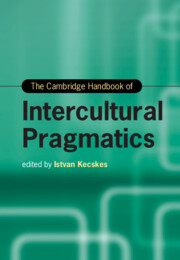Book contents
- The Cambridge Handbook of Intercultural Pragmatics
- Cambridge Handbooks in Language and Linguistics
- The Cambridge Handbook of Intercultural Pragmatics
- Copyright page
- Contents
- Figures
- Tables
- Acknowledgment
- Contributors
- Introduction The Rise of Intercultural Pragmatics
- Part I Theoretical Foundation
- Part II Key Issues in Intercultural Pragmatics Research
- Part III Interface of Intercultural Pragmatics and Related Disciplines
- 15 Semiotics and Intercultural Pragmatics
- 16 Sociopragmatics and Intercultural Interaction
- 17 Intercultural Pragmatics from the Perspective of English as a Lingua Franca
- 18 Intercultural Rhetoric
- 19 Politeness and Rapport Management
- 20 Corpus Pragmatics: Corpus-Based Intercultural Pragmatic Research
- Part IV Intercultural Pragmatics in Different Types of Communication
- Part V Language Learning
- Index
- References
16 - Sociopragmatics and Intercultural Interaction
from Part III - Interface of Intercultural Pragmatics and Related Disciplines
Published online by Cambridge University Press: 29 September 2022
- The Cambridge Handbook of Intercultural Pragmatics
- Cambridge Handbooks in Language and Linguistics
- The Cambridge Handbook of Intercultural Pragmatics
- Copyright page
- Contents
- Figures
- Tables
- Acknowledgment
- Contributors
- Introduction The Rise of Intercultural Pragmatics
- Part I Theoretical Foundation
- Part II Key Issues in Intercultural Pragmatics Research
- Part III Interface of Intercultural Pragmatics and Related Disciplines
- 15 Semiotics and Intercultural Pragmatics
- 16 Sociopragmatics and Intercultural Interaction
- 17 Intercultural Pragmatics from the Perspective of English as a Lingua Franca
- 18 Intercultural Rhetoric
- 19 Politeness and Rapport Management
- 20 Corpus Pragmatics: Corpus-Based Intercultural Pragmatic Research
- Part IV Intercultural Pragmatics in Different Types of Communication
- Part V Language Learning
- Index
- References
Summary
Sociopragmatics encompasses the study of social, interactional, and normative dimensions of language use, while intercultural pragmatics examines how language is used in social interactions between people who have different first languages and are usually considered to represent different cultures. While there are some points of overlap between them, the main aim of intercultural pragmatics is to analyze and theorize how language is used when participants have limited common ground and do not necessarily adhere to L1 preferred ways of speaking. It is thus argued in intercultural pragmatics not only that intercultural encounters are deserving of theorization in their own right, but that theorization in intercultural pragmatics can usefully inform pragmatics more broadly. The aim of this chapter is to consider how research in intercultural pragmatics can inform work in sociopragmatics, and vice versa. Following discussion of the main theoretical foundations of sociopragmatics, a case study examining the openings of first conversations in intercultural settings is used as a springboard to consider the place of sociopragmatics vis-à-vis intercultural pragmatics, and what insights each can bring to the other. The conclusion is that sociopragmatics would benefit from building more explicitly on the important empirical and theoretical insights offered by intercultural pragmatics.
Keywords
- Type
- Chapter
- Information
- The Cambridge Handbook of Intercultural Pragmatics , pp. 420 - 444Publisher: Cambridge University PressPrint publication year: 2022



